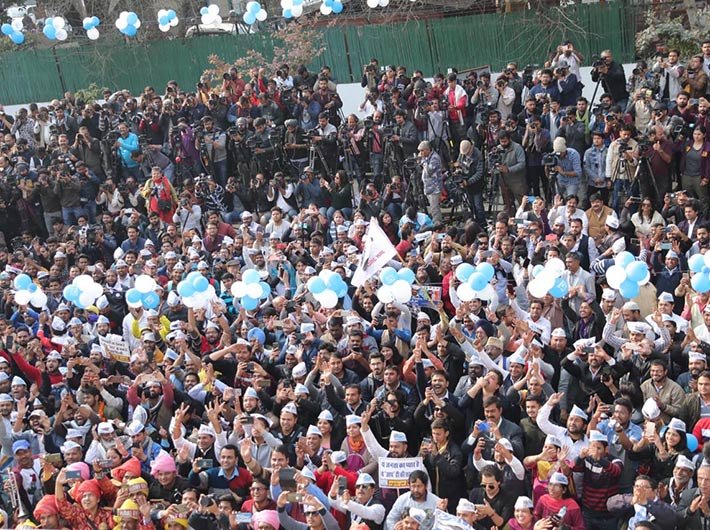AAP has maintained the nature of everyday issues in their crude form while addressing them both on paper as well as on ground
The party that came into existence on the intangible timeworn issue of corruption, transparency and increasing public investment through public savings is going on winning elections in Delhi with huge margins, consistently rowing the boat between doldrums and high tides. Somewhere between the doldrums of banal nationalism of the Congress statecraft and high tides of the BJP’s hyper nationalism, the AAP has found its intangible but deep roots capable of containing the waves eroding the nutrients of the social soil.
In discussions over the AAP’s politics and craft, it seems people are failing to put it in an exact political frame, which we are so used to doing. Some are of the view that it is trying to bring a balance of the left and the right while others believe it is not the true centre as people who attempted it could not really succeed in the past and they cite Rajiv Gandhi and Atal Bihari Vajpayee as examples. There is also a belief, which you hear about through discussions on politics in public places and public transports – true centrist approach has not been quite rewarding politically and does not provide any incentives for the politicians.
Eminent social scientist Shiv Visvanathan also once warned against the “banalisation of AAP” that might become its biggest tragedy. While discussing politics, parties and populist ideas, people miss accounting for the intangibles, which AAP seems to be focusing on through its work and policies. Usually people feel that if basic issues were resolved or overly repeated, politics would become meaningless and mundane, but AAP is somehow until now proving it wrong (not meaning that everything is covered by them as promised). Researches show that the old model of accounting is giving way to the new model of accounting for intangibles like concepts, measurement, information disclosure and other such content different from the traditional thinking of intangibles only in terms of patent, trademarks, and copyrights.
I remember in 2014, just before the general elections in India, a delegation of the European Union was visiting Allahabad’s GB Pant Social Science Institute to fathom the BJP wave and the realities of issues in the elections then. They enquired about the major election issues and mostly students responded by saying that the issues had always been the same – road, electricity and water. The feedback of the students indicated that these issues are never addressed and deliberately kept alive for the poorer sections by all the political parties as once solved they would have nothing else for the purpose of mobilisation. It seemed if such issues of everyday life were solved many political parties would lose their existence. BJP for sure had something else in mind to galvanise the political discussions and elections. Roti kapda aur makan became a high point in the 1970s both in Indian politics and films.
Kejriwal added bijli and pani to the makan along with health and education for the fulfillment of right to life with dignity as one of the major provisions of the Indian Constitution. These issues sound too mundane in this age of grand technological advancement, globalisation and nuclear weapons – not to forget the valiant issue of nationalism in the list of hyperbolic claims – because it is wrongly perceived that these issues are only about the mundane population who are not part of the stylized world. Addressing the issues in their real crude form by AAP makes it sound like an assignment taken up only for the poor. It is not the politics on the poor, which started with slogans like Gareebi Hatao and to an extent many are seeing the NYAY scheme of the Congress as an extension of the same kind of politics.
No political party has the audacity to deny the reality of these issues but the difference between the AAP and the other parties is that it has maintained the nature of these issues in their crude form while addressing them both on paper as well as on the ground. Others have tried to euphemise and create a glossy narrative of development camouflaging the grim view of the real state of affairs, that too mostly on paper. Schemes like the BJP’s Ayushman Bharat promises benefits within the existing infrastructure that is in tatters in its current form – snarled up in painful bureaucratic system, while the AAP came into existence on the idea of systemic change and seemed to maintain its focus on the ground. The Congress in Delhi did invest in macro infrastructure like transportation, flyovers, road construction but did not care for the intangible elements of it like cost effectiveness through thoughtful investment, reliability and cost consideration also in terms of time invested.
Developmental economists like Tim Jackson have also pointed out the limitations of politics, state policies, the finitude of the planet and the possibility of prosperity as or without growth. Instead of going on expanding the market and maximising profits of the few, the better method is considered that in which people are allowed to save and spend at the right place and increase revenue by controlling tax evasion and corruption through credible social, economic and political environment. Be it the AAP or any other government trying out such alternative models, they must be given due attention for the sheer purpose on various of exploring alternative possibilities to liberate the statecraft from the many vices blind corporatization brings in, controlling our imagination against the exploration of various paths to prosperity: accounting for intangible values and costs, being one.

